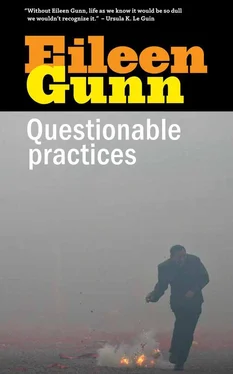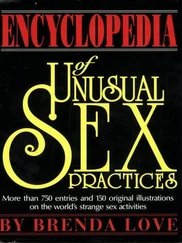Eileen Gunn - Questionable Practices
Здесь есть возможность читать онлайн «Eileen Gunn - Questionable Practices» весь текст электронной книги совершенно бесплатно (целиком полную версию без сокращений). В некоторых случаях можно слушать аудио, скачать через торрент в формате fb2 и присутствует краткое содержание. Год выпуска: 2014, Издательство: Small Beer Press, Жанр: Фантастика и фэнтези, на английском языке. Описание произведения, (предисловие) а так же отзывы посетителей доступны на портале библиотеки ЛибКат.
- Название:Questionable Practices
- Автор:
- Издательство:Small Beer Press
- Жанр:
- Год:2014
- ISBN:нет данных
- Рейтинг книги:5 / 5. Голосов: 1
-
Избранное:Добавить в избранное
- Отзывы:
-
Ваша оценка:
- 100
- 1
- 2
- 3
- 4
- 5
Questionable Practices: краткое содержание, описание и аннотация
Предлагаем к чтению аннотацию, описание, краткое содержание или предисловие (зависит от того, что написал сам автор книги «Questionable Practices»). Если вы не нашли необходимую информацию о книге — напишите в комментариях, мы постараемся отыскать её.
Eileen Gunn
Stable Strategies and Others
Questionable Practices — читать онлайн бесплатно полную книгу (весь текст) целиком
Ниже представлен текст книги, разбитый по страницам. Система сохранения места последней прочитанной страницы, позволяет с удобством читать онлайн бесплатно книгу «Questionable Practices», без необходимости каждый раз заново искать на чём Вы остановились. Поставьте закладку, и сможете в любой момент перейти на страницу, на которой закончили чтение.
Интервал:
Закладка:
Frederic was waiting for her. “What shall we do with that?” he asked, gesturing toward the tent.
“Burn it,” she said. She knew she had surrendered all authority to give such a command. But listening to her own voice, she knew too that she would be obeyed. “Burn it to the ground.”
Frederic nodded and two lovely young women whom Agnes realized with dull astonishment used to be the young Lexi and Latoya raised up hands that burst into fire. Stepping forward, they stroked the silks and velvets. Soft flames rose up the sides of the tent, merged, and became an inferno. When Agnes made no motion to get away from the heat, Frederic gently took her by the arm and led her toward the cool.
Agnes could feel the flames at her back. Shadows leaped and cavorted before her.
“What of Richard?” Frederic asked.
She touched the gem. “He did not care to share our lives without Melisaundre,” she said. “I gave him permission to return to his crystal, to his oblivion.”
Frederic crooked a sad smile. “ ‘He is not dead but sleeping,’ ” he quoted from one of Richard’s favorite books. “Perhaps he will reconsider someday, when we have remade the world into a pleasant place again. I… I will become the junior husband then, if that is what you wish.”
Agnes looked at him evenly, and realized for the first time how much Frederic desired and even, in his own peculiar way, loved her. Raising her head, she looked into the future. The humans would not rebuild the cities in her lifetime, but there would be towns. The elves would one by one fade away, into wells, into trees, into small, pathetic beings who served mankind and were rewarded with dishes of milk. She would have children, and then grandchildren. She would grow old, and fat, and revered. She would desire Richard often. But she would never see him again.
“No,” said Agnes firmly. “He’s gone forever. The time for fairy tales is past.”
Michael Swanwick and Samuel R. Delany at the Joyce Kilmer Service Area, March 2005
Output from a nostalgic, if somewhat misinformed, guydavenport storybot, in the year 2115
Transcribed by Eileen Gunn
Their journey took place in verdant March, when the sun was not yet so high in the sky as to be dangerous. The New Jersey Turnpike was redolent with the scent of magnolias, and the trees in the Joyce Kilmer Service Area were clad in exuberant green. What brought them, the nascent politician and the noted philosopher, to this place, in a vehicle that shed its rich hydrocarbons liberally into the warm, clean air?
The truth was that Michael Swanwick and Samuel R. Delany shared a taste for animal flesh, and had come to this bucolic waystation to satisfy their common need. “I’m a burger kind of guy,” said the future ruler of Russia. “So am I,” said the white-bearded semiotician, and they chose an imperial meat-patty palace for their repast.
As they stood in line, contemplating a panoply of burgers, fries, and blue raspberry Icee®s and basking in the cool green glow of fluorescent lights, Swanwick was struck with nostalgia for a time long past.
“I miss Howard Johnson’s,” he said. “Not the food, of course — I miss the orange-roofed temples, celebrated by Jean Shepard as sirens of the highway. Once upon a time, every rest area on the Jersey Turnpike had a Howard Johnson’s. ‘A landmark for hungry Americans.’”
Though Swanwick had spoken the words, each man, involuntarily, heard the chime of the ghastly jingle. “Funny thing,” he continued quickly. “It was capitalism that killed it. Marriott bought it for the real estate.”
“Red in tooth and claw,” said Delany. “I miss the pistachio ice cream cones, that’s all…. But here ,” he added in a soothing tone, “ here we have trading cards with robots on them.” He accepted a trading card from the cashier. It depicted Cappy, a sleekly androgynous silver-metal lover. “I want a different one,” he said.
“Have it your way,” said the cashier, shrugging. He handed Delany another card, this one featuring Crank, a grubby makeshift robot with rust under his gnawed fingernails.
Delany laughed, a musical sound somewhere between a snort and a giggle. “I’ll keep this one,” he said. He ordered a beef patty made with real beef, medium rare, topped with horseradish and béarnaise sauce, kosher dill slices on the side.
“Have it your way,” said the cashier again.
“Are you a robot?” asked Swanwick, suddenly concerned. The cashier did not reply.
“I would like a big, sloppy, greasy double cheeseburger with lettuce and tomato and all the trimmings,” Swanwick told the cashier. “I want ketchup, mayonnaise, mustard, and Russian dressing with beluga caviar. Hold the pickle.”
“Caviar is available only at the Walt Whitman Service Area,” said the cashier, frowning. “You can’t always have every thing your way.” He gave Swanwick a trading card depicting Aunt Fanny, a matronly, pink, lipstick-wearing robot with a protuberant posterior. Swanwick accepted it with bemusement, wondering whether Burger King offered the same card in the United Kingdom. “Can I have another, too?” he asked. The cashier handed him a card with a pigtailed Lolita robot on it. “Another?” The third was Madame Gasket, who was a bit scary, frankly, for a trading card. He couldn’t get any thing his way.
“Lucky in love, unlucky at cards,” said Delany.
“They hand these things out to children?” Swanwick asked, glancing again at Madame Gasket.
They paid for their meals in the devalued currency of the late-period religio-capitalist hegemony, and took their food trays to a small table at a window overlooking the Sunoco station.
“ Bon appétit ,” said Delany, gesturing with his hamburger as one would with a wineglass.
“ Priyatnovo appetita ,” replied Swanwick with a similar gesture. He had recently returned from the Urals, where he had been the toast of Ekaterinburg.
At first they ate in hungry silence, gazing out at the gas station, as languid pump attendants with huge palm-frond fans hailed approaching automobiles and waved them toward available fueling bays as though they were New Jersey’s famous zeppelins. Then, having taken the edge off their appetites, the two men continued the conversation they had begun in the car, the one great debate that writers and thinkers everywhere have carried on since writing and thinking first evolved: the debate about the ultimate futility of writing and thinking.
“I’m a cult writer in Russia,” said Swanwick, “and I’m a cult writer in the United States. And I’m sick of it.”
“Nothing so terrible about being a cult writer,” said Delany. “Christianity started out as a cult, and look at it now.”
“I want to make some difference in the world, communicate with the mass of humanity , have an effect .” He gestured toward the crowded freeway. “I want to change entire lives for the better .”
“Have you thought of a different career?” asked Delany gently. “Perhaps emigration to a land of greater opportunity? You speak some Russian, do you not?”
“ Nyemnoshka ,” Swanwick answered, with a modest shake of his shaggy head. “A smidgeon,” he translated.
“Maybe you should consider pulling up stakes, retooling for the new millennium. As a cult writer in the U.S., you’re nothing. You have considerably less effect on how the world fares than a Hollywood screenwriter, which is low indeed in the social hierarchy. But as a cult writer in Russia, you’d have some clout. They are afraid of writers in Russia, and with good reason. You could leverage your celebrity into a political career, take control of that long-suffering country, and change the world. Of course, you could also get killed.” He sighed. “It’s a sad thing, but nobody kills writers in the U.S. They just don’t matter enough.”
Читать дальшеИнтервал:
Закладка:
Похожие книги на «Questionable Practices»
Представляем Вашему вниманию похожие книги на «Questionable Practices» списком для выбора. Мы отобрали схожую по названию и смыслу литературу в надежде предоставить читателям больше вариантов отыскать новые, интересные, ещё непрочитанные произведения.
Обсуждение, отзывы о книге «Questionable Practices» и просто собственные мнения читателей. Оставьте ваши комментарии, напишите, что Вы думаете о произведении, его смысле или главных героях. Укажите что конкретно понравилось, а что нет, и почему Вы так считаете.












